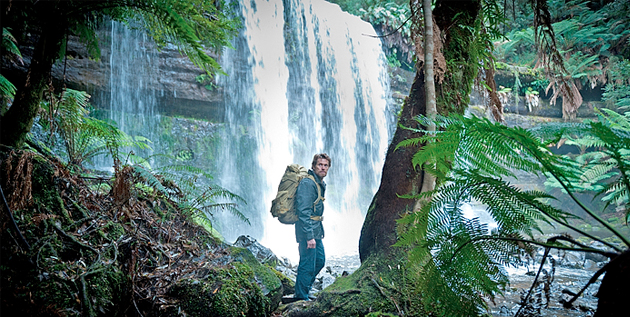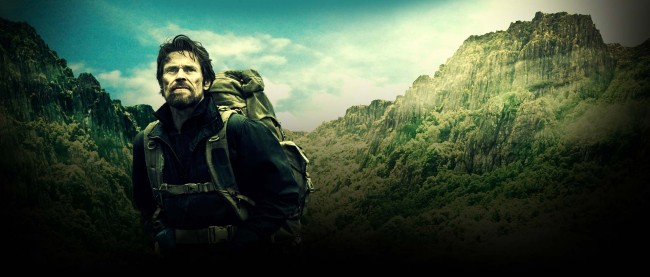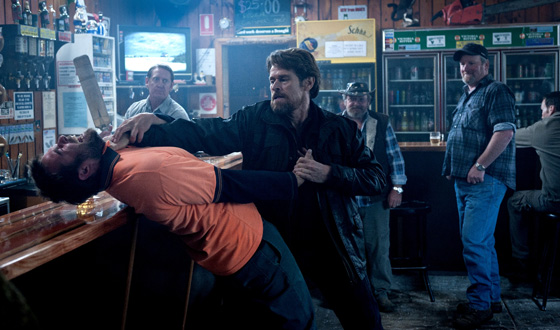
On press duty for their new film The Hunter at the Toronto International Film Festival, director Daniel Nettheim and Willem Dafoe have been discussing Tasmania, Julia Leigh’s source material, and their cinematic sensibilities. It’s a character-driven piece that showcases its star’s craft while also the exotic environment his job of capturing the last Tasmanian tiger brings (our review here).
Sitting down as part of a roundtable interview with two fellow Americans, an Italian, a Spaniard, a Chilean, and a German, the two were quite forthcoming and conversational when it came to sharing stories about their work to us. With discussions ranging from hunting verisimilitude to leeches and even economics, both Dafoe and Nettheim proved to be generous in their candor and very excited about their film.
The transcript from the roundtable follows.
The character—Willem—I thought was, ah—interesting choices you had to make because you don’t have reams of dialogue. So we learn so much about him by what he does—a solitary man who is really very precise about things. When you see that, do you want to learn about all of that equipment that he’s [using]?
Willem Dafoe: I think you have to. First of all, you have to because—just practically speaking with the traps and that sort of thing. In filming, it’s amazing how important it is for you to be graceful with it. You’re out in the woods and you’re just doing these things—you have to have this up your sleeve. It’s not like I got a lot of time to practice, but I had to know what I was doing.
Then, of course, it’s always beautiful to learn something specific. I think that really roots the character because, as you learn anything, it puts you in a different state and opens your mind and you start kind of embracing different ways of seeing. And when you do that it makes the inhabiting of the character much easier because it has a practical base and also you kind of condition your brain to leave yourself behind and create a new set of circumstances—a new set of impulses.
Daniel Nettheim: Also, for me, that process of setting the traps and things that really mattered to Willem was a real eye-opener because, although I had been living with it on the page, you know, for the years it took us to adapt the novel, I wasn’t prepared for how beautiful it actually was and how precise, how disciplined, how much elegance and visual beauty that was in it.
I have read the press notes and you were talking about how the character goes on a journey from being unfeeling to somebody who sort of connects more to the people around him. But I have to say that at the beginning I didn’t necessarily find him unfeeling insomuch as he was just business-like. He broadens his horizons to, you know, find other interests. I mean, how did you—both of you—want the character to start off? Is he a mercenary or is he just a guy who makes a living doing what he does?
Nettheim: Um, I think that the professional aspect of what he was saying is very much true. This is a man who is devoted to his work first and foremost. And so that’s kind of all we learn about him. We didn’t, I mean in the script, we didn’t ever reveal much backstory about the character, which is why when I first spoke to Willem about the project, I kind of said, “Look, this is—it’s up for invention. There’s kind of a lot of choices to be made—go for it”.
Dafoe: Um, you know, I think that’s fine. I only say he’s unfeeling in the respect that business-like—and as I approach those scenes, it’s very clear that I don’t want to get sucked into anything. For example, the kids are very sweet and they are playful. And the general tendency when you’re around them is to kind of smile and be kind to them and soft. I had to really make a very clear effort to be cold with them. You know, there are places that kind of go beyond business-like because he can—he can tell the little girl to stay out of […] his room, but the way he does it is, he might as well be saying, you know, he might as well be swearing at them. It’s very tough, I think. So, I was conscious about that. And also, with the woman, he’s curious only to the degree that it affects his work at the beginning. And then he’s slowly seduced into, you know, being involved with her. Which is in his mind anyway.
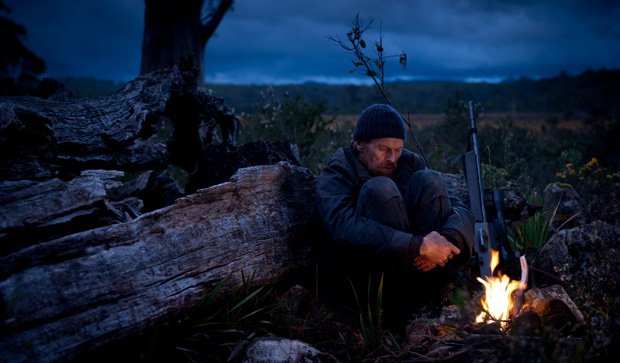
It’s his undoing, isn’t it? Letting emotions in—
Dafoe: It depends, because that’s also what saves him. Because I think if it is a redemption story, and if he—the thing that’s not expressed is, I think, there’s a shadow, and you can imagine he’s probably—
If he’s doing this job and this is the kind of work he does, he’s probably done some bad things. And I think that’s—by the end it’s clear that he doesn’t want to do those bad things anymore.
[To Dafoe] Was the training very different from the one you did for Platoon?
Dafoe: Ah, it’s different but related. You’re right it’s a—you’re out in the bush, learning to do things. That was very important in Platoon and it was very important in this. And in both cases we had experts that knew this. And not only what I just learned practically—to notch this part of the spring here so I could pull down the tree so that would hook here. I learned those things practically, but to see how the person showing me did it and how they approached their—where that bush craft fit into their life and also what kind of personality they were also, I think, informed on what I was doing because just being with them, you sort of take on their mindset.
Yeah, but what is your connection with the wilderness? Because, I mean, you really look so at ease on both movies actually—this one a bit more [laughter].
Dafoe: I like the wilderness. I mean, you know, I joke sometimes. I say I’m not an actor; I’m an animal. [laughter] No, it’s true because my favorite things to do aren’t always expressed in a certain kind of psychology or—I relate most to doing things. I feel most free and most engaged when I’m doing things and moving through a space, a natural space.
Have you ever been hunting before?
Dafoe: No. I mean, only in the movies. [laughter] I’ve hunted people in movies, been a soldier a lot, you know, or a cop or I’m looking for the bad guy. So I know that part. As far as in life—no. When I was a kid I—one of my connections to Canada was that every summer we’d go up and go fishing in a remote part with my father. That was kind of the bonding thing. So, I grew up with the wilderness some, but not specifically hunting.
Daniel, on that sense of place. This is taking us to—I don’t even know if many Australians get to this part of the country—
Nettheim: That’s true—
How did that inform the storytelling? You mention [how] actually seeing some of the handicrafts that had to be done changed […] your perspective on the characters, but how about actually getting there? Is it just a matter of pointing the camera and having wonderful vistas?
Nettheim: Look, I—from my first visits to Tasmania—I was struck by how different it was to mainland Australia. Even though it’s only an hour’s flight from Sydney, the landscape’s extraordinary, the island has been separated from the mainland for some tens of thousands of years, the animals look different, the birds are different, the sounds are different, the sort of rocks are different. And it hasn’t been captured a lot on the big screen. And I guess, there are parts of it that look like other parts of Australia and I was looking for the parts that didn’t.
Now, on our first trips, we did some amazing walks and found some great locations that were, you know, mind-blowing, but you could never get a crew in there—there were no roads. So then we had to find the closest equivalent that you could drive to, walk twenty minutes with the gear, look that way and have one landscape, look that way have another one, and look that way and have a third. But, that’s pretty easy in Tasmania.
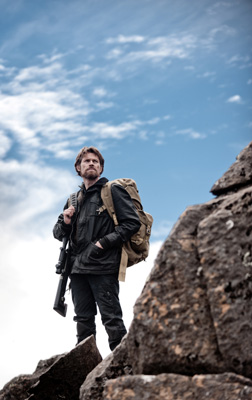 Dafoe: Then the other thing is, of course, it’s never that—
Dafoe: Then the other thing is, of course, it’s never that—
It’s all very beautiful, but some are just flat out more photogenic than others, to tell you the truth. And also, one of the tricks that I kind of forget until you were talking right now is, he—particularly Daniel—had to figure out a way to find the right location for the right piece of the story because every time I go into the—like the three or four times I go, there is a progression. […] You should feel some sort of—there are sort of story points to cover. Like those blue pools. Remember when the kid shows him? That area and the feeling that he’s going higher and higher—you know, that huge vista. You had to make the story of the topography seem credible too and some of the things, when I see it, some of the more stunning ones, I remember not being—experientially—not being as stunning as—you know, what’s stunning to your eye may not always be the best shot on film.
Nettheim: I’ve also got to say that the landscape looks very beautiful in the film, but what it doesn’t convey is how difficult some of that terrain is—just to walk. And Willem does it so gracefully, but, you know, in reality he’s trudging through […] water this deep with leeches and swamp and it’s physically hard to walk in. The rocks are physically hard to climb. Film can’t do that justice.
Did any of the cast have any difficulty with leeches?
Dafoe: Ohhhhhhh. [laughter] Your brother [Matt Nettheim] had the best story.
Nettheim: Oh, yeah. Leeches, um, they do like warm places and my brother—who was shooting stills on the film—found one in his underwear. [laughter]
Dafoe: I’m sorry—I [have] to tell the story a little better than that. [laughter]
It was the end of the day and because sometimes the weather was very brutal, he had lots of layers on. And he got into the car ready to go. And he thought, “My God, what’s going on? I, I peed my pants. What’s going on? What’s going on?” And he checked himself out and there was a big pool of blood because the leeches were attached to his—
It was Stand by Me—
Nettheim: He had to wring out his underwear.
Dafoe: One day I counted forty leeches on me.
Willem, obviously you’re at a point in your career where you can pretty much select any project—
Dafoe: That’s not the way it ever is! [laughter]
But you do all kinds of stuff and you do a lot of projects every year and I’m wondering if you kind of have a must-do list—a must-have list—on the kind of projects you select and specifically, what drew you to this one?
Dafoe: Okay. I don’t really have a list. It’s kind of reactive. I think that you react off of the last thing you’ve done and you react off of how you feel. And I never ever have really—
And sometimes it bothers me and sometimes I think it’s a blessing. I’ve never been an actor that has put lots of projects together. It’s really been kind of one by one. And I think that has to do with the kinds of projects I’m attracted to. I don’t work just to work, but I love to work.
In this case, I just—it’s always a combination of things. I loved the story; I was excited that we were going to shoot in Tasmania; the way Daniel approached me and how he presented and told the story, I knew it was a passion project for him; I liked [how] Daniel had worked a long time in TV and I could tell he was really eager to get this—this was a story that could only be told in film, in cinema, and he seemed excited about that. It just seemed—you know, you want to be in the room with people that are passionate and turned on and have a burning desire to do something. And that, in combination with the interesting story—that I didn’t know quite where it would go—was resonate for me. And the adventure of filming in Tasmania and being the outsider in an Australian film—all those things appealed to me.
[To Dafoe] You flew all the way to Tasmania to shoot this film. Is there any way you would fly to Chile?
Dafoe: I’m talking to the Larraín brothers right now.
[To Nettheim] Do you know them?
Nettheim: No I don’t.
Dafoe: You know Post Mortem or Tony Manero?
Nettheim: Oh yeah. Yeah.
[To Nettheim] I’m curious, what attracted you to the material? Was it sort of the challenge of the complexity of it? Because it’s almost funny when I think about it—if you boil it down to the essentials—the most upbeat aspect of the ending of this movie is the murder of an endangered animal. [laughter] Which somehow feels like a triumph. That’s pretty difficult to pull off.
 Nettheim: Well now that sums it up. I was really attracted to the complexity of the story and also its, kind of, many thematic layers. For me—it’s an adaptation of a novel of course—and when I read the novel, it resonated on so many levels. But it wasn’t didactic. It was a really compelling narrative. It was a mystery, there were thriller elements, there was action, and you know, great drama. But it got you thinking about the subject on whole other levels. It did for me.
Nettheim: Well now that sums it up. I was really attracted to the complexity of the story and also its, kind of, many thematic layers. For me—it’s an adaptation of a novel of course—and when I read the novel, it resonated on so many levels. But it wasn’t didactic. It was a really compelling narrative. It was a mystery, there were thriller elements, there was action, and you know, great drama. But it got you thinking about the subject on whole other levels. It did for me.
I also was attracted to the landscape—the idea of this intimate human story playing out against this kind of spectacularly beautiful location. And I knew Tasmania a bit from having been there as a kid and a teenager. So it really seemed like the combination of elements. And also I thought it [had] really interesting characters that could appeal to really great actors.
Was there a particular role of Willem’s—obviously he’s a great actor—was there something that made you think he’s right for this part. Because—[looking to other press member] you mention Platoon—at the very beginning I thought of Clear and Present Danger, but he turns out not to be quite so much a machine that he is in that movie.
Nettheim: Well, it’s—strangely I think one of the first things that got me thinking about Willem was an old still from Platoon, of Willem in the jungle. It just seemed to fit. I knew a bit of Willem’s work. I’d always been impressed by what he could do with characters and I started to imagine Willem inhabiting this character. And it was a film I wanted to see.
Typecasting isn’t always that bad. You’re going to keep to the jungle or in the forest and enjoy—
Dafoe: Yeah I like it. It’s better than the, you know, driving up to the studio gate and having them say, “Good morning”. Hearing the inane chatter in the make-up chair and going into a cold room with a set and doing your thing. It’s not my ambition.
But you have found—you kept a foot in that world, in the studio picture world. But you also worked with Abel Ferrara again—
Dafoe: Yes, it’s a picture I like a lot.
Do you find that because of your stage background that the independent world is something closer to your acting sensibilities?
Dafoe: I try not to preference, but I think it’s pretty clear that I find the most interesting people and the most interesting material in the world where personal cinema can be made. And I think it’s a very different impulse because—it’s not always the independent world, this can also happen in the studio system—but a film driven by a filmmaker who has a whole vision, a way of seeing things, and they’re making work. And I like to connect myself to them and make work with them. Always with a personal base—it’s made for their personal inquiry, their interests. As opposed to—more often seen in the studio world—people that enjoy working with the language, the craft of movies, to make a product that appeals to the public and they’re always somehow thinking of the public.
I want people to like the movies, but I think the way you approach it is that you approach it for yourself and the people that you’re working with. And I find myself attracted to that situation. And they’re usually people that are unconventional and haunted by this desire to make something where—as I said, it can still happen in the studio world. The studio world attracts people more that can see their career, are pragmatic, they hear what the product is, they want to get it, they want to punch the buttons, they want to find the things that work for the audience. I believe that if you find something that is really beautiful and really personal and has some sort of base for yourself, there will be like-minded people out there if you express it well. That’s just more interesting for me.
That carries over to your stage choices as well—
Dafoe: It does—
You just did Manchester; you just did an experimental piece. So it’s not a matter of packing a huge haul to you, it’s a matter of being able to say something even if it’s a small—I hate to say—
Dafoe: I think so, but actually that was part of a big production. That was huge.
Speaking of the people you’ve worked with, I just saw you at the film festival here a couple of years ago with Sam Neill for Daybreakers. Did that have—did you guys know at the time that you were going to be doing this together? How’s it like working with him?
Dafoe: [To Nettheim] I think, I was in before Sam? Or was he already in?
Nettheim: No, you were in first. I think.
Dafoe: Yeah, but I was very happy. Sam’s great. He’s great to work with. I think he’s really a great actor and he’s a great person. He’s very funny.
I try to describe him—I came onto something that I’m really happy about, and it’s really true of him. When he’s serious I think he’s joking and when he’s joking I think he’s serious. [laughter] He’s got a wicked sense of humor.
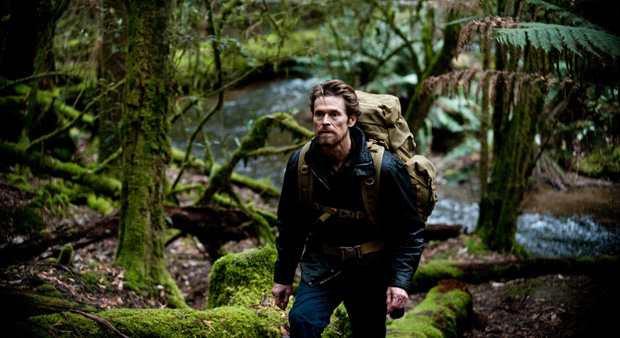
I mentioned the Abel Ferrara film, which is the end of the world. We’ve got Melancholia here at the festival, which is the end of the world. Is there something particularly appealing about—
Dafoe: Ah, you know—don’t be fooled by the description. I think it’s really just a convention to explore how you live your life. I haven’t seen Melancholia, so I won’t make the comparison. So, it’s not like it’s attractive—
No, I’m thinking in the zeitgeist—
Dafoe: I think there is, but the positive aspect of this kind of malaise, this kind of depression—I mean how many times in a day do you hear the word crisis, okay? It’s pushing us also to find the connections with people that we won’t normally have a connection with. And the irony is, we found our way there through this economic thing, this economic nightmare. And through exploring how capitalism became a monster. How America—when it goes down—it’s going to drag China down too. [laughter] That’s, to me—I mean, I’m not an economist—but it’s sort of a revelation. I think that’s in the air, so people are kind of thinking more globally.
How was that Dan?
Nettheim: It was beautiful. It wasn’t about The Hunter, but that was great! [laughter]
MODERATOR: Any last questions please?
Dafoe: I hope it’s for Daniel.
Well—I’ll ask—how was it working with Morgana and Finn? They’re very good in this, very disparate characters—him so internalized. Did you kind of have to rein him in to do that?
Nettheim: Look, you know, in reality, the kids off-screen are quite different than the kids onscreen. But, nevertheless, what you see onscreen is an aspect of them. So it was really a matter of getting them to focus on that bit, but pretty much from the moment we called cut, you were looking at two completely different kids.
The beautiful thing about working with Willem and Sam meant that I could devote my time to the kids. I didn’t need to look after the adults; they were looking after me.
[To Dafoe] I just have to ask real quick about Italy. Do you have any projects there?
Dafoe: Ummm, Abel and I are talking about something, but we’ll see. And I intend to work with Giada [Colagrande, his wife] again, but I don’t think we’ll film in Italy.
The Hunter played at the 2011 Toronto International Film Festival.

